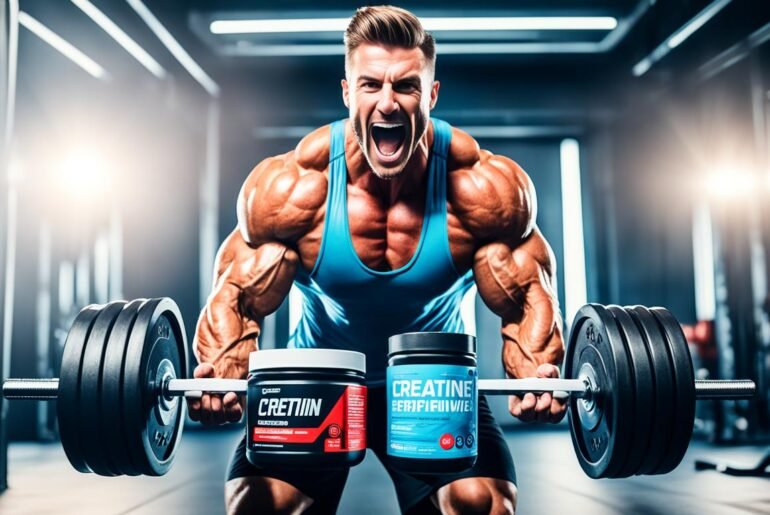In the relentless pursuit of peak performance, nearly 74% of athletes turn to dietary supplements, with creatine ranking as one of the most popular choices. Notably, this isn’t solely the domain of strength athletes; endurance athletes—who participate in rigorous competitions like marathons, triathlons, and cycling events—are progressively harnessing creatine’s benefits for enhancing athletic performance. As a supplement for endurance, creatine’s potential extends beyond mere muscle mass and strength, delving into the realms of hydration strategies and cognitive resilience—key elements in the battle against the exhaustive nature of endurance events.
But perhaps the most intriguing twist in the narrative surrounding creatine involves its impact on sports nutrition and hydration, two crucial factors in the realm of endurance events. While some harbor reservations, fearing that creatine may exacerbate dehydration and cramping, current research suggests otherwise. Far from being a detriment, creatine may actually offer performance enhancement through improved fluid retention, challenging long-held misconceptions and offering a refreshing perspective for endurance athletes seeking that extra edge.
As someone deeply invested in maximizing my athletic output, I’ve followed the scientific discourse closely, keen to understand how creatine could positively influence my performance. In this article, we’ll dissect the facts, debunk the myths, and explore how this powerhouse supplement could be a game-changer for those looking to push their limits in endurance sports. So, let’s dive into the science and practical wisdom behind creatine supplementation and its symbiotic relationship with hydration—because when it comes to endurance events, every second and every stride counts.
Key Takeaways
- Understanding creatine’s role in improving hydration and athletic performance in endurance sports.
- Examining the research that refutes common myths about creatine causing dehydration and cramping.
- Exploring how creatine supplementation can be a strategic component of sports nutrition for endurance athletes.
- Discussing the importance of hydration strategies in optimizing creatine’s efficacy during endurance events.
- Highlighting the cognitive benefits of creatine that may contribute to performance enhancement in long-duration activities.
Understanding Creatine’s Role in Muscle Function and Energy
As a seasoned fitness enthusiast, I’ve always been intrigued by the impact of various supplements on exercise performance and sports performance. Creatine monohydrate, in particular, stands out for its proven benefits. Intriguingly, it serves as a pivotal molecule in ATP production, essential for powering muscle contractions during intense physical activities.
Exploring the fine details of how creatine improves athletic output, I’ve learned that it isn’t merely about the immediate energy boost. It’s the increase in phosphocreatine stores within the muscles that facilitates rapid replenishment of ATP during high-intensity exercise. This science translates into the tangible benefits athletes feel when they can sustain longer bouts of effort with less fatigue.
The Biochemistry of Creatine in ATP Production
Delving deeper into the biochemical role of creatine, it’s apparent why many athletes turn to supplementation. Phosphocreatine recharges the molecule adenosine diphosphate (ADP) back into ATP, the primary energy currency for muscle contractions, especially during short-term, high-intensity activities. This cyclical energy mechanism permits sustained athletic performance and, in my experience, helps push limits during workouts.
Natural Dietary Sources vs. Supplementation
While natural dietary sources such as red meat and fish do provide creatine, they offer it in relatively minute quantities. For those of us aiming for peak performance, dietary intake simply isn’t sufficient to maximize the ergogenic effects of creatine. Hence, the substantial interest in creatine monohydrate supplementation to saturate the muscles’ phosphocreatine reserves.
To effectively illustrate the value of creatine supplementation compared to dietary sources, a comparison table outlines the distinct advantages for athletes.
| Dietary Source | Typical Creatine Content (g per serving) | Supplement | Creatine Content (g per serving) |
|---|---|---|---|
| Red Meat | 0.5 – 1 | Creatine Monohydrate Powder | 5 |
| Fish | 1 – 1.5 | Creatine Monohydrate Capsules | 3 – 4 |
| Poultry | 0.4 – 0.8 | Liquid Creatine | 2 – 2.5 |
In conclusion, my exploration into the world of creatine has solidified my understanding of its significant role in enhancing not just ATP production and muscle contractions, but overall sports performance. Whether through direct supplementation or increased dietary intake, optimizing creatine levels can lead to profound improvements in exercise capacity, making it a staple in the nutritional plan of serious athletes across the globe.
Debunking Myths: Creatine’s Effects on Hydration and Cramping
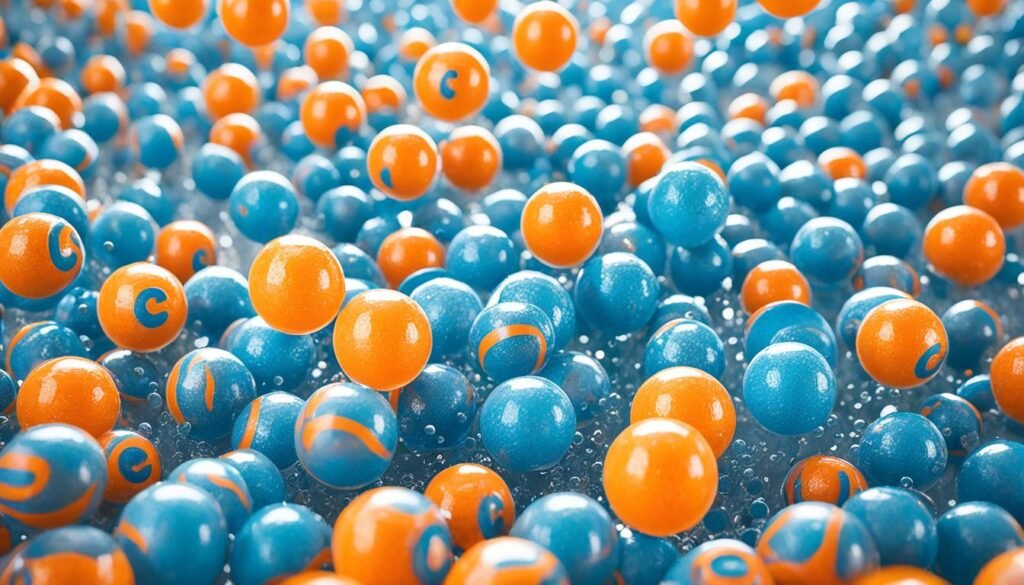
As a sports nutrition enthusiast, I’m always intrigued by the persistent myths around supplements. It’s time to clarify the misconceptions about creatine—specifically, its impact on hydration and cramping. Contemporary research provides a refreshing perspective, illustrating the benefits of creatine beyond merely enhancing muscle function.
Scientific Evidence on Creatine and Fluid Balance
Investigations into hydration strategies often unearth concerns about supplements. However, scientific consensus refutes the claim that creatine is detrimental to hydration. Quite the opposite, studies show creatine may enhance the body’s fluid retention capacity, thereby supporting hydration levels vital for endurance athletes. A systematic review by esteemed organizations like the International Society of Sports Nutrition heralded creatine’s positive influence on fluid balance, debunking the hydration and cramping myths that have long haunted creatine’s reputation for safety in sports nutrition.
Implications of Creatine on Thermoregulation and Electrolyte Balance
When dissecting the nuances of creatine benefits, it’s impressive to note its role in thermoregulation and electrolyte balance. What strikes me particularly is how creatine is associated with optimal body water distribution, which is essential for maintaining electrolyte balance during long and arduous events. This is a testament to the evolution of sports nutrition, where old myths are dispelled by rigorous research, clearing the track for athletes to safely utilize creatine for their endurance pursuits.
| Myths vs. Facts | Dehydration Risk with Creatine | Cramping Likelihood with Creatine |
|---|---|---|
| Myth: Creatine causes dehydration. | Decreased | No increase found |
| Myth: Creatine leads to muscle cramps. | Not supported by evidence | Lowered in athletes |
| Fact: Creatine aids fluid balance. | Enhances total body water volume | Helps maintain cellular hydration |
| Fact: Creatine supports thermoregulation. | Associated with reduced heat stress | Contributes to stable body temperature |
In conclusion, while misconceptions about creatine may persist, it is my role to delineate fact from fiction. Armed with current insights from sports nutrition, I can confidently assert the advantages of hydration strategies that incorporate creatine, all while ensuring athlete safety and optimal performance.
Creatine and Hydration in Endurance Events
As an experienced endurance athlete, I’ve learned that managing creatine and hydration strategies is integral to maintaining peak athletic performance. My investigations and trials have led to a deep understanding of how creatine supplementation, when paired with effective hydration strategies, can bolster both endurance training efforts and actual sports performance. It challenges previously held beliefs around creatine and the potential for water retention negatively impacting hydration status.
Hydration strategies are a textbook component for any endurance athlete, but when we add creatine into the mix, we need to pay closer attention to how the body responds. Balancing hydration with creatine intake might allow my muscles to store higher glycogen levels, providing me with an ample energy reserve during exhaustive endurance events. This indeed translates to significant benefits during the high-intensity segments of competition where sustaining a competitive pace is essential.
I’ve noted from several reputable sources that creatine’s role in endurance training goes beyond simply energy provision—it can enhance the muscle’s ability to retain water, which can be instrumental in supporting metabolic processes during extended athletic performance.
From a scientific standpoint, the optimal combination of creatine for endurance use seems intertwined with personalized hydration protocols. Meticulously tracking my fluid intake in tandem with creatine has shown me that these supplementation practices do not pose the risk of dehydration that many fear.
- Monitoring water intake to ensure creatine is effective without causing bloating.
- Strategizing electrolyte replenishment according to training intensity and environmental conditions.
- Adjusting creatine dosages based on activity level and hydration needs.
Emphasizing both athletic performance and safety, I’ve also made it my mission to align my supplementation schedules with the demands of my training regimen, ensuring my body is optimally prepared for the endurance challenges ahead.
While personal experience is my guide, I continue to delve into research and collaborate with sports nutritionists to refine my approach. This synergy, I believe, is key to unlocking the full benefits of creatine as a supplement for endurance. Conclusively, the articulated balance between hydration and creatine supplementation is crucial for any endurance athlete aiming for superior performance.
The Importance of Hydration Strategies for Endurance Athletes

As someone who has experienced the rigorous demands of endurance events, I can attest to the critical role that hydration plays in athletic performance. A comprehensive understanding of hydration strategies is essential, not just for maintaining stamina but for ensuring overall health. As we delve into the nuances of these strategies, it becomes abundantly clear that they are far more than a mere afterthought; they are the foundation upon which athletic endurance is built.
Hydration’s Impact on Athletic Performance
Throughout my career, I’ve observed a direct correlation between an athlete’s hydration level and their performance. Staying adequately hydrated facilitates peak physical and cognitive function, allowing athletes to maintain focus and coordination over extended periods. This is particularly vital for endurance athletes who participate in long-distance events; even slight dehydration can impair both muscle function and mental clarity, resulting in performance downturns that can be the difference between victory and defeat.
Effective Hydration Techniques During Long-Distance Events
Individualized hydration techniques are crucial for success in endurance sports. Climate, intensity, duration, and individual physiology all dictate unique hydration needs. Embracing the complexity of hydration and leveraging the potential intracellular hydration benefits of creatine, I encourage athletes to tailor their hydration techniques carefully. By doing so, they ensure that they can endure any climate, any challenge, with optimal hydration levels.
Here is an outline of hydration techniques which endurance athletes might find valuable:
- Pre-event hydration planning, accounting for weather conditions and sweat rate
- Consistent hydration throughout the event, using individualized fluid replacement strategies
- Post-event recovery hydration to replenish any fluid and electrolyte deficits
Consider the following table that demonstrates the comparison of popular hydration techniques applicable in varying conditions for endurance athletes:
| Technique | Application | Benefits |
|---|---|---|
| Pre-loading with Electrolytes | Before Event | Prevents electrolyte imbalance and muscle cramps |
| Carbohydrate-Electrolyte Solutions | During Event | Sustains energy, maintains osmolality |
| Water Replacement Based on Sweat Loss | During Event | Individualized hydration, prevents overhydration |
| Isotonic Sports Drinks | After Event | Replenishes fluids and provides quick energy recovery |
| Weight Monitoring | Before & After Event | Gauges hydration level changes and directs post-event rehydration |
It is evident that a meticulous approach to devising hydration strategies significantly influences the outcome for endurance athletes. By choosing the right hydration techniques, endurance athletes can enhance their performance, prevent the detriments of dehydration, and finish strong in their respective long-distance events.
Enhancing Endurance Training with Creatine Supplementation
As I delve deeper into optimizing athletic performance, I’ve discovered that creatine supplementation plays a pivotal role in enhancing endurance training. Specifically, when integrated into high-intensity interval training (HIIT), it contributes to notable gains in muscle power and stamina.
Adaptations in High-Intensity Interval Training
In the high-octane world of high-intensity interval training, creatine’s efficacy is undisputed. The increased availability of ATP—a direct benefit of creatine supplementation—allows enthusiasts like myself to endure more prolonged and intense workouts. This adaptogenic effect not only improves immediate performance enhancement but also expedites long-term athletic development. With creatine, my body is more prepared to handle the strenuous demands of HIIT, laying the groundwork for substantial endurance adaptions.
Optimizing Muscle Power and Repeated Sprint Performance
Focusing on cream-of-the-crop performance goals, creatine stands out for its capacity to boost muscle power and sustain high levels of output during repeated sprint performance. This potent supplement has empowered me to smash through previous plateaus, facilitating training sessions that are more intense and fruitful than ever before. Athletes in pursuit of optimal endurance training will find creatine to be a game-changing element of their nutritional arsenal, pushing the boundaries of their high-intensity endeavors.
Potential Health and Cognitive Benefits of Creatine
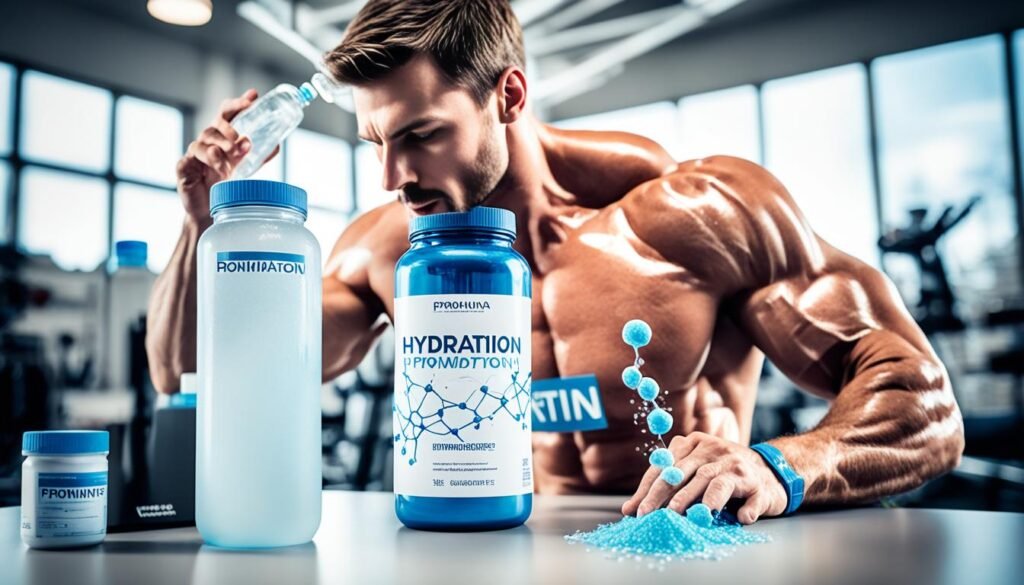
In recent years, sports nutrition has expanded to recognize a wider spectrum of creatine benefits, extending well beyond its well-known role in muscle energy metabolism. Significant insights have been gained into how creatine influences not just physical performance but also contributes to overall health and brain health. My investigation into this versatile supplement has revealed a compelling link between creatine and cognitive benefits.
Emerging Research on Creatine and Brain Function
Groundbreaking studies are now exploring the frontiers of creatine’s impact on cognitive processes. The cognitive benefits associated with creatine are especially relevant in high-pressure environments, such as during endurance events, where sustained mental clarity is imperative. The ability of creatine to reduce mental fatigue is one such cognitive benefit that could alter the outcome of an athlete’s performance by enabling improved focus and decision-making under the rigors of competition.
How Creatine Supplementation May Aid in Recovery and Injury Prevention
One of the most promising aspects of creatine is its role in recovery and injury prevention. As I delve into current research, I observe how creatine’s properties aid in diminishing exercise-induced muscle damage. This not only accelerates the body’s recovery process post-exercise but also has the potential to mitigate the occurrence of injuries. It suggests that incorporating creatine into an athlete’s regimen could lead to more productive training sessions and a lower risk of setbacks due to muscle strain or trauma. The implications for health benefits here are significant, offering a dual advantage of protecting the body while enhancing its recuperative capabilities.
In summary, as a professional dedicated to the intersection of sports nutrition and optimal performance, I find that creatine stands out for its multifaceted benefits. It transcends mere athletic supplementation to support wider health preservation strategies. With ongoing research fortifying our understanding of creatine’s broader implications, we may be on the cusp of fully unlocking its potential beyond the gym and the racetrack, into everyday health maintenance and cognitive fortification.
Addressing Concerns: Weight Gain and VO2 Max Considerations

Amidst the discussion on sports nutrition, particularly regarding creatine supplementation, a recurring debate involves its implication on weight gain and VO2 Max, a measure of oxygen uptake and an indicator of cardiovascular fitness. On my journey through the realm of endurance cycling and focused athletic performance, I’ve seen how vital it is to delve into these factors comprehensively.
Before we tackle the technical aspects, let’s explore how these concerns affect athletes directly.
Does Creatine Supplementation Affect Weight Class Athletes?
As a weight class athlete, the slightest fluctuation on the scale can mean the difference between qualifying or being disqualified. With creatine supplementation often associated with short-term weight gain, it’s essential for athletes within this category to strategically plan their supplementation to account for potential changes in body composition without compromising their ability to compete.
Weight management is more than maintaining a number; it’s about optimizing body function and performance. Thus, using creatine requires a delicate balance – embracing its benefits while keeping an eagle eye on the scales.
Understanding VO2 Max and Creatine’s Role in Oxygen Uptake
VO2 Max represents the utmost capacity of an athlete’s body to transport and utilize oxygen during incremental exercise. In-depth analysis and personal experience suggest that while creatine supplementation can lead to increased weight gain from water retention, it isn’t inherently detrimental to an athlete’s VO2 Max or overall oxygen uptake. Still, it’s advisable to regularly monitor and compare VO2 Max levels over time to understand the supplementation’s effect on your body.
It is the athlete’s prerogative to assess whether the advantages of creatine align with their sports nutrition goals, especially for endurance sports where every second and every breath can edge you closer to victory.
Below, I’ve compiled a profile of perspective adjustments I’ve found useful:
| Creatine Supplementation Strategy | Weight Class Consideration | VO2 Max and Performance |
|---|---|---|
| Meticulous Weighing and Timing | Ensuring peak condition for competition | Little to no negative impact when planned |
| Consistent VO2 Max Check-ins | Adapting intake to maintain weight requirements | Creating a comprehensive performance profile |
| Integration with Hydration Protocols | Countering potential weight gain from water retention | Optimizing fluid balance for enhanced oxygen transport |
In conclusion, creatine’s impact on weight gain should be considered alongside its capacity to potentially not alter VO2 Max in a negative manner. The key, as always, lies in personalization and adaptation for the specific needs of each athlete within their domain of athletic performance.
Practical Considerations for Creatine Use in Sports Nutrition
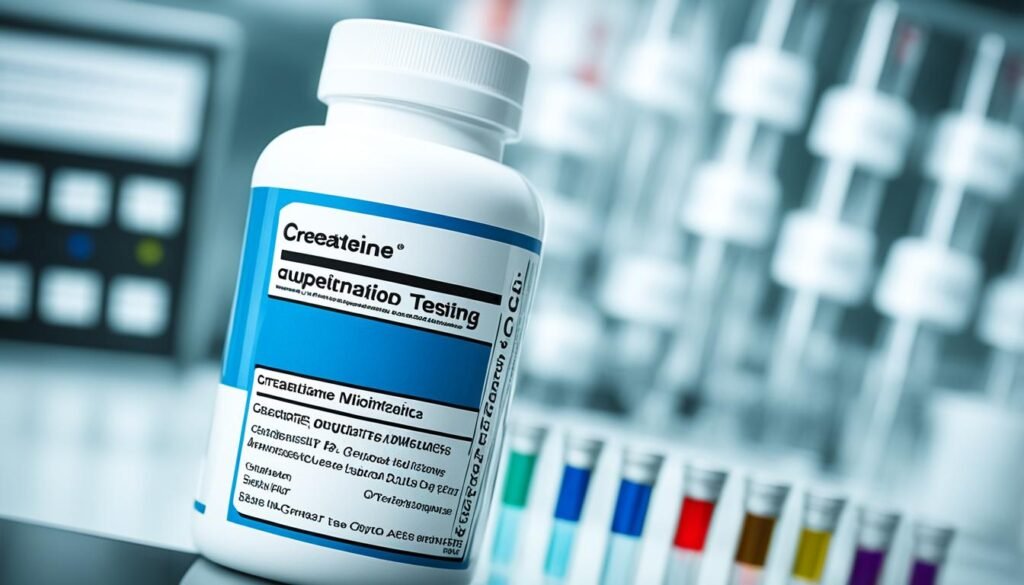
As I dive into the realm of sports nutrition, it’s essential to address the key factors that come into play when incorporating creatine into my routine. Mastering creatine use goes beyond merely deciding to supplement; it’s about understanding recommended dosages, timing, and critically, the quality of the product I choose. Adhering to these guidelines will enhance my performance while ensuring health and safety.
Recommended Dosages and Timing for Efficacy
When focusing on recommended dosages of creatine monohydrate, the consensus in sports nutrition circles is a daily ingestion of approximately five grams. This amount is designed to saturate my muscles over time, building a reserve of accessible energy for when I need it most. Timing, while flexible, is often considered less critical; however, some studies suggest that post-workout consumption, possibly paired with carbohydrates, may optimize my body’s absorption and maximize benefits.
Selecting High-Quality Creatine and Certification Standards
Ensuring quality assurance in my creatine supplementation is non-negotiable. Turning to products that meet robust certification standards proves paramount in avoiding the risk of ingesting banned substances. Renowned certifications such as NSF Sport, Informed-Sport, and HASTA indicate rigorous testing and compliance with high-quality manufacturing practices. By opting for certified brands, especially those offering Creapure, known for its purity, I can expect a high-grade form of creatine monohydrate that minimizes the potential for gastrointestinal discomfort and optimizes absorption. This level of attention to detail in selecting my creatine supplement lays the foundation for a successful and responsible approach to sports nutrition.
Creatine use is a science as much as it is an art in the broad spectrum of sports nutrition. Finding that perfect confluence of recommended dosages, precise supplement timing, and unwavering quality assurance touches the essence of effective performance enhancement, aiming to deliver results on and off the field.
Examining Creatine’s Impact on Marathon Running and Endurance Cycling

As I delve into the complex interplay between creatine supplementation and endurance sports, it’s vital to recognize the distinct demands of marathon running and endurance cycling. Both activities command high levels of stamina and energy over extended periods, yet the nature of their exertion differs, with cycling allowing for brief respites and running demanding continuous, rhythmic effort.
In the realm of continuous sports, marathon running presents a compelling case study for creatine’s ergogenic potential. Runners seeking athletic performance enhancement often engage in arduous training to improve their stamina and speed. While creatine may have limited direct effects on the consistent pace of long-distance runs, I find its capacity to aid in recovery between training sessions of particular interest. Furthermore, in light of its impact on muscle strength and sprint performance, strategic creatine use might be a game-changer in those pivotal races where a short burst can mean the difference between victory and defeat.
Applications of Creatine in Continuous vs. Intermittent Sports
The crux of intermittent sports like endurance cycling lies in the ability to fluctuate between intensities—when to conserve energy and when to deploy explosive power. During a grueling ascent or the final push to the finish line, the amplified muscular energy reserves afforded by creatine can be decidedly advantageous. This underscores the pivotal influence of creatine impact in disciplines that intersperse endurance with sprint finishes.
Performance Metrics: How Creatine Can Influence Time Trials and Sprint Finishes
Turning our attention to performance metrics, such as time trials and sprint finishes, both of which are integral components of marathon running and endurance cycling, unveils further layers to creatine’s utility. While outright endurance may not be significantly affected, the increased availability of phosphocreatine—which creatine optimizes—can bolster an athlete’s capability to perform at maximal intensity during key moments, potentially leading to personal bests and podium placements.
| Performance Factor | Marathon Running | Endurance Cycling |
|---|---|---|
| Energy during continuous effort | Moderate impact | Moderate impact |
| Recovery between intervals | Significant benefit | High benefit |
| Power in sprint finishes | Elevated capacity | Increased performance |
| Cognitive function and decision-making | Potentially improved | Potentially enhanced |
As I parse through empirical data and anecdotal evidence, the prevailing narrative suggests that creatine—which is often associated with strength and high-intensity activities—does indeed have a place at the endurance athlete’s table. By understanding and exploiting the nuanced effects of this versatile supplement, individuals dedicated to marathon running and endurance cycling can punctuate their enduring efforts with powerful finishes, thereby optimally enhancing their athletic performance.
Customizing Creatine Intake: Individual Variation and Response
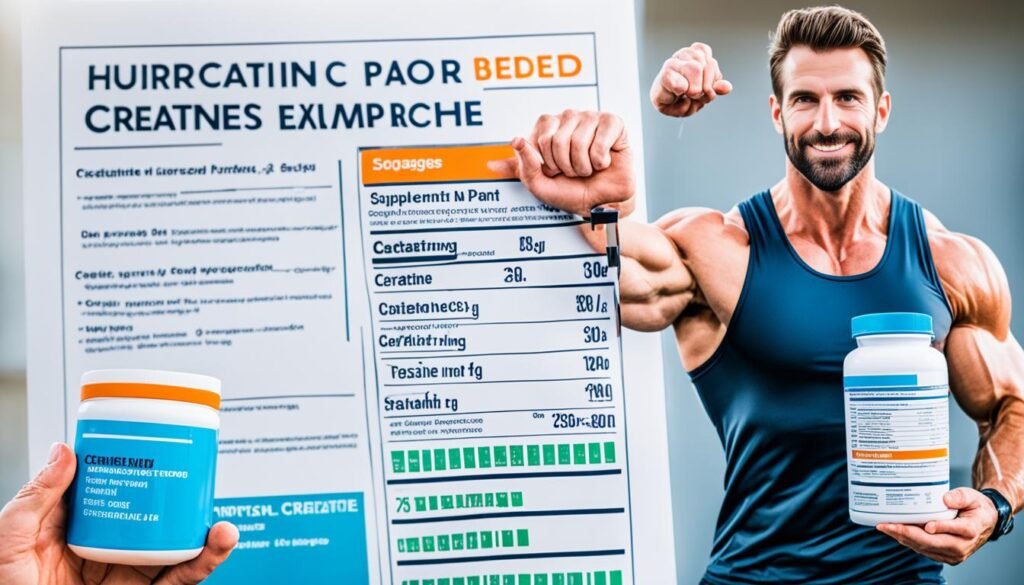
When considering creatine intake for enhancing sports performance, it’s important to acknowledge that individual variation plays a significant role in one’s creatine response. Personalizing one’s supplementation strategy is not just advisable but critical. This personalization considers factors like training status, genetics, and even one’s personal schedule, which might lead to a practice known as creatine cycling. As a professional dedicated to supplement customization, I aim to help athletes fine-tune their creatine use to their unique physiologies and lifestyles.
Factors Influencing Creatine Response: Training Status and Genetics
Understanding that individuals metabolize and respond to supplements differently is paramount. Some athletes may experience marked improvements in strength and endurance, while others might see less pronounced benefits. This phenomenon is partly due to innate genetic differences that affect how our bodies store and use creatine. Furthermore, an athlete’s training status—whether they’re a seasoned professional or a weekend warrior—also influences how creatine may impact their performance. These distinct factors are what make personalized nutrition plans essential for optimizing creatine usage.
Creatine Cycling and Responsiveness: Listening to Your Body
Creatine cycling is not a one-size-fits-all approach; it involves alternating between periods of taking creatine and periods of not taking the supplement. This practice can help some athletes avoid plateau effects and maximize their body’s response. However, the key is listening to your body and being mindful of how it reacts to changes in supplementation. For those engaging in sports that demand peak performance, such as during competition seasons, adjusting creatine cycling schedules to align with these periods can be particularly advantageous.
For my part, I’ve observed that this customization has allowed the athletes I work with to leverage the benefits of creatine more effectively, enabling a more strategic approach to supplement use. As with any nutrition regimen, it is crucial to remain vigilant and adaptable, ensuring that the integration of creatine into one’s diet augments rather than impedes athletic achievement.
Conclusion
As an enduring athlete continuously engaging with the complexities of sports nutrition, I’ve come to appreciate the profound influence that creatine and hydration have on maximizing performance. Research boldly challenges old myths, providing a new perspective on the hydration synergy that exists when these elements are effectively combined. It’s not merely about endurance training, but about optimizing every bit of energy and cognitive ability to sustain throughout demanding competitions.
The Synergy of Creatine and Hydration in Maximizing Performance
My exploration into the realm of sports supplements for endurance has led me to understand how creatine benefits far exceed the scope of momentary muscle power. It is about a greater synergy, where proper hydration magnifies creatine’s role in energy production and overall exercise performance. This partnership, so deeply integrated into our physiology, has the potential to redefine the standards of athletic excellence, particularly in endurance training.
Making an Informed Decision: Creatine as a Supplement for Endurance
Making an informed decision about incorporating creatine into one’s regimen is no small feat. It requires a diligent balancing act, considering the multitude of factors that constitute both individual goals and physiological nuances. My decision to welcome creatine into my endurance toolkit has been underpinned by ongoing research and personalized response evaluation. Embracing its potential wholeheartedly means committing to a relentless pursuit of that sweet spot—where the science of supplementation harmonizes with my uncompromised ambition for peak athletic prowess.
FAQ
How does creatine benefit athletic performance during endurance events?
Creatine supplementation enhances muscle function by increasing intramuscular phosphocreatine stores, which contribute to the production of ATP, the primary energy source during high-intensity exercise. This can help delay fatigue and improve exercise performance, potentially allowing for better endurance and higher-intensity efforts during crucial moments of events.
Can creatine monohydrate lead to dehydration or muscle cramping?
Current research, including statements by the International Society of Sports Nutrition, suggests that creatine does not cause dehydration or cramping. In fact, it may help maintain fluid balance and support thermoregulation, making it a safe supplement for endurance athletes when proper hydration strategies are in place.
Should endurance athletes have specific hydration strategies when taking creatine?
Yes, while creatine can help with fluid retention in the muscles, it’s important for endurance athletes to develop individualized hydration plans. This ensures they can take full advantage of creatine’s ergogenic effects while maintaining electrolyte balance and hydration during prolonged physical activity.
What role does creatine play in recovery and cognitive function for athletes?
Creatine has been associated with reduced exercise-induced muscle damage, potentially leading to faster recovery times. Additionally, emerging research indicates creatine may also lower mental fatigue and enhance cognitive function, which is beneficial for maintaining focus and making strategic decisions during endurance events.
How should an athlete determine the optimal dosage and timing for creatine supplementation?
The general recommendation for creatine intake is approximately five grams daily, without the need for loading or cycling phases. Timing does not significantly impact the benefits, but taking creatine post-workout in conjunction with carbohydrates may enhance uptake. It’s essential to choose high-quality, certified products and consider individual response when determining the best regimen.
Does creatine supplementation affect VO2 Max and weight-sensitive athletes?
While creatine can lead to weight gain due to increased fluid retention, this does not inherently impair VO2 max. Weight-sensitive athletes should monitor their response to creatine, including potential impacts on body composition and VO2 max, and determine how the supplement aligns with their specific sport’s demands and weight class requirements.
What is the difference between creatine’s effects on continuous and intermittent endurance sports?
Creatine is typically known for its benefits in high-intensity, short-duration activities. While its direct impact on steady-state endurance performance may be limited, it can be advantageous in endurance sports that include intermittent surges of high intensity, where enhanced muscle power and quick recovery between bouts are beneficial.
Can endurance athletes benefit from cycling their creatine intake?
Endurance athletes may choose to cycle their creatine intake based on training phases and competition schedules to optimize its effects. Personalizing creatine supplementation to align with individual needs, training demands, and physiological responses is key to maximizing benefits and minimizing any potential negative impacts.
How does creatine supplementation work in synergy with hydration to maximize endurance performance?
Creatine and hydration work together to optimize muscle function and energy systems during endurance events. Proper hydration strategies tailored to complement creatine supplementation can help maintain fluid balance, support cellular hydration, and ensure that athletes can sustain performance levels even during extensive exertions.




